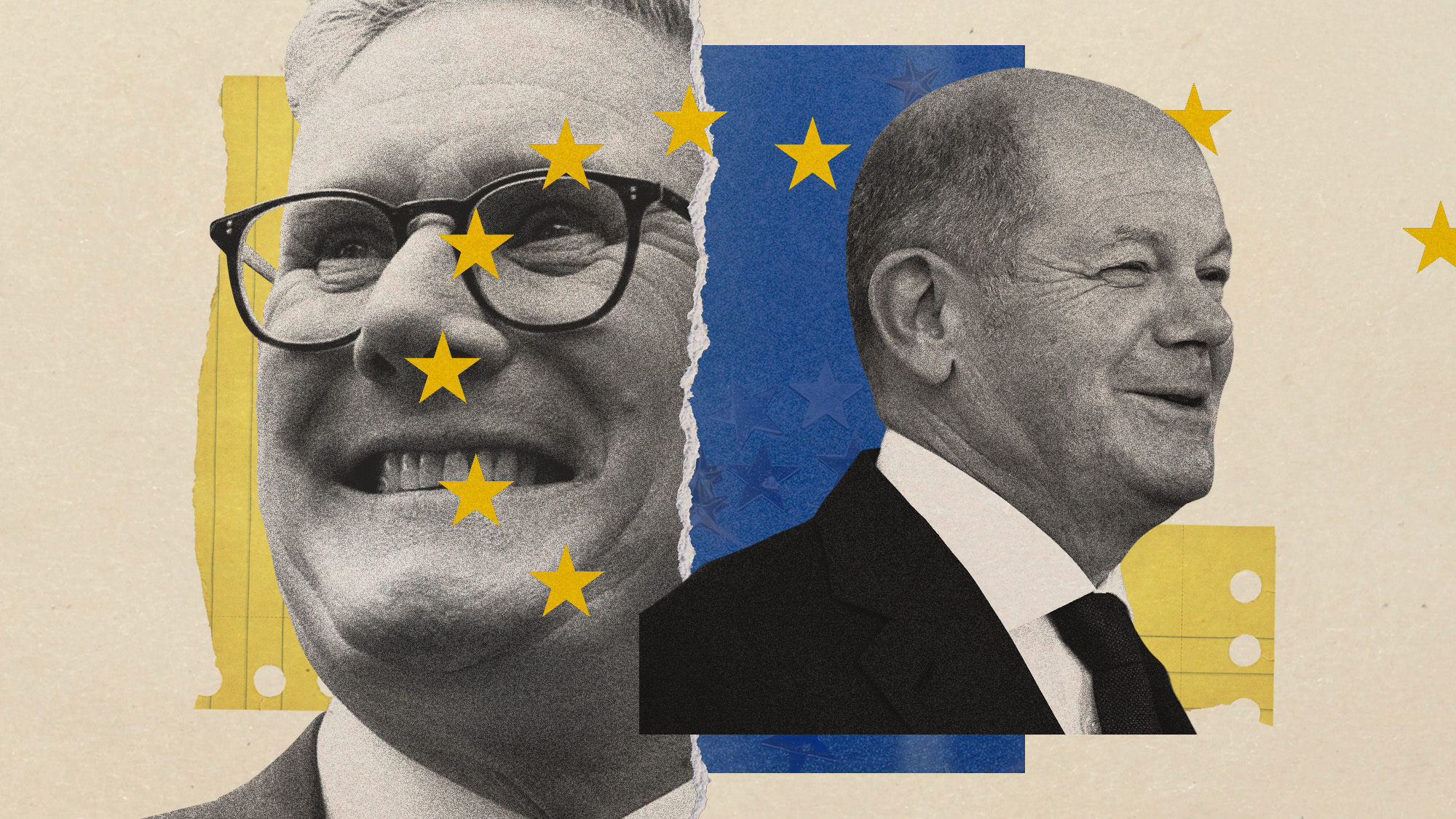What does Keir Starmer want from the EU?
Starmer hopes for defence co-operation and access to German market but huge obstacles remain

A free daily email with the biggest news stories of the day – and the best features from TheWeek.com
You are now subscribed
Your newsletter sign-up was successful
Keir Starmer said he hopes that an "ambitious" UK-Germany treaty will be agreed by the end of the year.
The PM was speaking after he met with German Chancellor Olaf Scholz in Berlin this morning.
"Growth is the number one priority for my government... and building relations with our partners here in Germany and across Europe is vital to achieving it," said Starmer.
The Week
Escape your echo chamber. Get the facts behind the news, plus analysis from multiple perspectives.

Sign up for The Week's Free Newsletters
From our morning news briefing to a weekly Good News Newsletter, get the best of The Week delivered directly to your inbox.
From our morning news briefing to a weekly Good News Newsletter, get the best of The Week delivered directly to your inbox.
The PM said that the countries had a "shared determination to harness the power of government for the service of working people, and that's what we are doing today: a new UK-Germany treaty, a once-in-a-generation chance to deliver for working people in Britain and in Germany".
But the problem for the PM is that "it is not yet clear how much improved bilateral relations with European nations can boost the UK economy", said the BBC's diplomatic correspondent James Landale, especially when "post-Brexit rules determine how and what we trade with the EU as a whole".
What did the commentators say?
Starmer kicked off his "two-day lovebomb" of European allies by opening negotiations on the UK's biggest-ever treaty with Germany, said London Playbook.
"No matter how many times" he "protests he won't reverse Brexit, return to free movement or join a youth mobility scheme", his "friendly language will be seized on with delight in Brussels", but the "real question" is how this "charmfest" translates into hard policy.
A free daily email with the biggest news stories of the day – and the best features from TheWeek.com
Downing Street said the proposed treaty will be about "increased collaboration" in a number of areas from "market access", to "innovation and tech", trade "across the North Sea", and "the environment".
Starmer's officials will be "trying to secure preferential access for British businesses to the German market", focused on certifications, tenders and legal hurdles, said Geraldine Scott in The Times.
But it's unclear "how comfortable Brussels would be with Germany striking a direct agreement with Britain", given that the country still belongs to the single market.
The PM will discuss a "landmark" economic and defence accord with Scholz, said Reuters, which they hope will "bring about an unprecedented degree of bilateral military cooperation".
The Nato allies, who are Western Europe's biggest defence spenders, are keen to make an agreement ahead of a "possible scaling back of US military support for Ukraine" if Donald Trump returns to the White House.
The partnership "could resemble the Lancaster House pact between Britain and France agreed in 2010", said the news agency, with pledges to "create a joint force and share equipment and nuclear missile research centres".
Starmer is also keen to "increase joint action" on illegal migration, including furthering intelligence sharing to intercept and shut down organised immigration crime rings, wrote Albert Toth for The Independent. He is "likely to find an ally" in Scholz, who is under pressure on the issue after three people were killed in an attack by an asylum seeker last week.
What next?
Overall, Starmer's approach "represents a departure from the previous government", which "remained less open to the prospect of greater collaboration with the EU", said The Independent.
He "has few hang-ups" over "dynamic alignment with EU standards", wrote Mujtaba Rahman, managing director for Europe at Eurasia Group, in the Financial Times, nor "the level playing field or the role of the European Court of Justice in policing new agreements". Things he is "ready to consider" include a visa scheme for EU nationals aged 18 to 30 – an early priority for Brussels.
But obvious obstacles remain. Germany is keen on a mobility scheme for young Europeans to live and work in Britain, the "very thing" that the UK government ruled out last week, said London Playbook.
An EU source told The Times that Starmer needs to realise "that any access to the EU's single market comes with obligations on mobility and alignment with European laws, on food safety for example".
From Berlin, Starmer will head to Paris for the Paralympics opening ceremony this evening, before meeting Emmanuel Macron and French business leaders tomorrow.
Chas Newkey-Burden has been part of The Week Digital team for more than a decade and a journalist for 25 years, starting out on the irreverent football weekly 90 Minutes, before moving to lifestyle magazines Loaded and Attitude. He was a columnist for The Big Issue and landed a world exclusive with David Beckham that became the weekly magazine’s bestselling issue. He now writes regularly for The Guardian, The Telegraph, The Independent, Metro, FourFourTwo and the i new site. He is also the author of a number of non-fiction books.
-
 The ‘ravenous’ demand for Cornish minerals
The ‘ravenous’ demand for Cornish mineralsUnder the Radar Growing need for critical minerals to power tech has intensified ‘appetite’ for lithium, which could be a ‘huge boon’ for local economy
-
 Why are election experts taking Trump’s midterm threats seriously?
Why are election experts taking Trump’s midterm threats seriously?IN THE SPOTLIGHT As the president muses about polling place deployments and a centralized electoral system aimed at one-party control, lawmakers are taking this administration at its word
-
 ‘Restaurateurs have become millionaires’
‘Restaurateurs have become millionaires’Instant Opinion Opinion, comment and editorials of the day
-
 Vietnam’s ‘balancing act’ with the US, China and Europe
Vietnam’s ‘balancing act’ with the US, China and EuropeIn the Spotlight Despite decades of ‘steadily improving relations’, Hanoi is still ‘deeply suspicious’ of the US as it tries to ‘diversify’ its options
-
 Will Peter Mandelson and Andrew testify to US Congress?
Will Peter Mandelson and Andrew testify to US Congress?Today's Big Question Could political pressure overcome legal obstacles and force either man to give evidence over their relationship with Jeffrey Epstein?
-
 Does standing up to Trump help world leaders at home?
Does standing up to Trump help world leaders at home?Today’s Big Question Mark Carney’s approval ratings have ‘soared to new highs’ following his Davos speech but other world leaders may not benefit in the same way
-
 How long can Keir Starmer last as Labour leader?
How long can Keir Starmer last as Labour leader?Today's Big Question Pathway to a coup ‘still unclear’ even as potential challengers begin manoeuvring into position
-
 What is at stake for Starmer in China?
What is at stake for Starmer in China?Today’s Big Question The British PM will have to ‘play it tough’ to achieve ‘substantive’ outcomes, while China looks to draw Britain away from US influence
-
 Can Starmer continue to walk the Trump tightrope?
Can Starmer continue to walk the Trump tightrope?Today's Big Question PM condemns US tariff threat but is less confrontational than some European allies
-
 EU-Mercosur mega trade deal: 25 years in the making
EU-Mercosur mega trade deal: 25 years in the makingThe Explainer Despite opposition from France and Ireland among others, the ‘significant’ agreement with the South American bloc is set to finally go ahead
-
 Alaa Abd el-Fattah: should Egyptian dissident be stripped of UK citizenship?
Alaa Abd el-Fattah: should Egyptian dissident be stripped of UK citizenship?Today's Big Question Resurfaced social media posts appear to show the democracy activist calling for the killing of Zionists and police